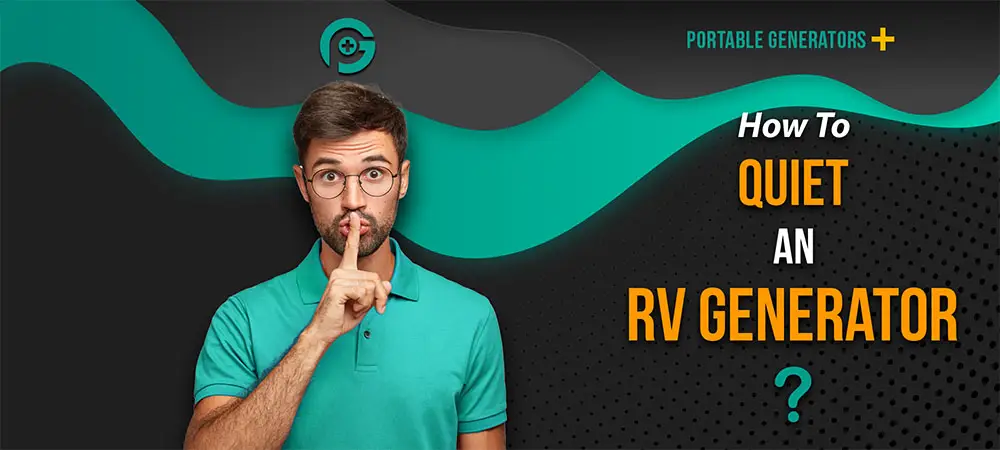How To Quiet An RV Generator? - Quick Answer...
Quieting an RV generator can significantly improve your camping experience. One common method is to use a specialized generator silencer kit, which helps dampen the noise produced. Additionally, placing the generator on a soft surface, such as rubber mats, can also reduce vibration and noise.
Another approach is to use soundproofing enclosures or barriers around the generator. Some RV owners also prefer to invest in inverter generators, which are naturally quieter than traditional models.
Introduction
Question: How To Quiet An RV Generator?
So you’ve got yourself an RV generator, but the noise it produces is driving you up the wall, interfering with your peace and tranquility while you’re out enjoying the great outdoors. Well, fear not! In this article, we’ll provide you with some simple yet effective tips on how to quiet an RV generator.
From insulation to exhaust silencers, we’ve got you covered. Say goodbye to the irritating noise and say hello to a peaceful and relaxing camping experience.
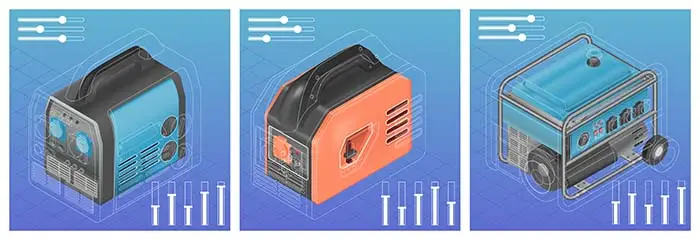
NOTE: We know the question “How To Quiet An RV Generator?” is seriously badly written, but it is the way the question is most often searched for. To appear as an answer in the search engines, we have to quote the question as asked. Cheers.
Choosing the Right Generator
Consider the Noise Level
When choosing a generator, it is important to consider the noise level it produces. Generators can be quite loud, which can disturb not only you but also your fellow campers.
Look for generators that are specifically marketed as quiet or low noise. These generators are designed with noise-reducing features and insulation materials that help minimize the sound they produce.
It’s worth investing in a quieter generator to ensure a peaceful camping experience for everyone.
Look for an Inverter Generator
Inverter generators are known for their quiet operation, making them an excellent choice for RV camping. Unlike conventional generators, which run at a constant speed regardless of the load, inverter generators adjust their speed based on the power demand.
This not only helps save fuel but also reduces noise levels. Inverter generators also produce clean and stable power, making them suitable for powering sensitive electronics like laptops and smartphones.
To discover more about this, you can check out our article ‘Difference Between Inverter Generators vs. Conventional Generators’
Consider the Size and Power Output
The size and power output of a generator are important factors to consider when choosing one for your RV. While you want a generator that can provide enough power to run your appliances and devices, you also want to ensure it is not overly powerful, as larger generators tend to be noisier.
Assess your power needs carefully and choose a generator that meets those needs without unnecessary excess.
Regular Maintenance
Clean the Exhaust System
Regularly cleaning the exhaust system of your generator is essential for its optimal performance and noise reduction. Over time, carbon deposits and debris can accumulate in the exhaust system, causing it to become clogged and produce excess noise.
Use a soft brush or cloth to clean the muffler and exhaust pipe, and remove any deposits or obstructions. This simple maintenance task can go a long way in reducing the noise generated by your RV generator.
Inspect and Tighten Components
To prevent any loose or vibrating components from creating additional noise, it’s important to regularly inspect and tighten them. Check the bolts, screws, and other fasteners on your generator to ensure they are secure.
If you notice any loose or damaged parts, have them repaired or replaced immediately. By keeping all components properly tightened, you can minimize rattling noises and maintain a quieter generator.
Check for Loose or Damaged Parts
In addition to tightening components, regularly check for any loose or damaged parts. Pay attention to the generator’s housing, panels, and covers, as well as any external accessories. If you find any loose parts or damage, secure or repair them accordingly.
Loose or damaged parts can create unnecessary vibrations and contribute to increased noise levels. By addressing these issues promptly, you can maintain a quieter RV generator.
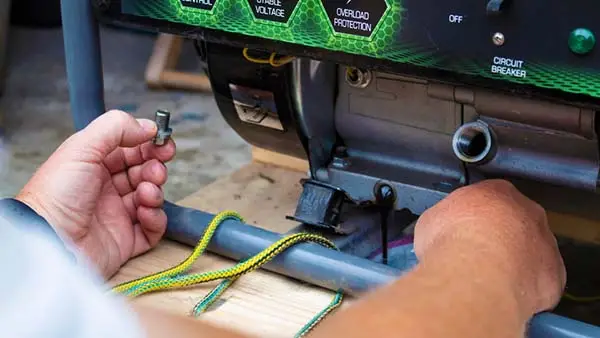
NOTE: We know the question “How To Quiet An RV Generator?” is seriously badly written, but it is the way the question is most often searched for. To appear as an answer in the search engines, we have to quote the question as asked. Cheers.
Use Soundproofing Materials
Install a Soundproof Box
One effective way to reduce the noise emitted by your RV generator is to install a soundproof box around it. A soundproof box is essentially an enclosure that surrounds the generator and helps contain and absorb noise.
When building or selecting a soundproof box, look for materials with sound-dampening properties, such as high-density foam or mass-loaded vinyl. Ensure the box is properly sealed to prevent noise leakage, and consider incorporating ventilation to maintain proper airflow for cooling.
Add Soundproofing Insulation
Another effective method to reduce noise is to add soundproofing insulation to your RV generator’s enclosure. Soundproofing insulation materials, such as acoustic foam or fiberglass, help absorb and dampen sound waves, resulting in reduced noise levels.
Line the interior of the generator enclosure with these materials, paying extra attention to the walls facing your camping area. This will help significantly reduce the noise heard outside the enclosure.
Use Rubber or Foam Mats
Placing rubber or foam mats beneath your generator can help minimize vibrations and, consequently, noise. These mats act as shock absorbers, isolating the generator from the ground and reducing the transmission of vibrations.
Choose durable rubber or foam mats that are designed to resist the weight and heat of a generator. By using these mats, you can effectively dampen the noise produced by your RV generator.
Modify the Generator Enclosure
Increase Ventilation
Proper ventilation is crucial for the safe and efficient operation of your generator. However, increasing ventilation can also help reduce noise levels. By allowing more airflow, you help dissipate heat more effectively, preventing the generator from overheating and running at high speeds, which can lead to increased noise.
Consider adding additional ventilation openings or installing fans to improve airflow within the generator enclosure.
Install a Baffle System
A baffle system is an effective way to reduce the noise escaping from your RV generator enclosure. By placing sound-absorbing baffles within the enclosure, you can redirect and absorb sound waves, preventing them from traveling outward.
Baffles can be made from materials such as acoustic foam or mass-loaded vinyl, which effectively dampens noise. Strategically place the baffles to ensure they cover areas where noise is most likely to escape.
Add Sound-Dampening Material to Enclosure Walls
To further reduce noise levels, consider adding sound-dampening materials to the walls of your generator enclosure. These materials, such as mass-loaded vinyl or acoustic panels, are designed to absorb and block sound waves.
Apply them to the inside surfaces of the enclosure to minimize noise reflections and prevent sound from escaping. This extra layer of sound insulation can make a significant difference in reducing the overall noise generated by your RV generator.
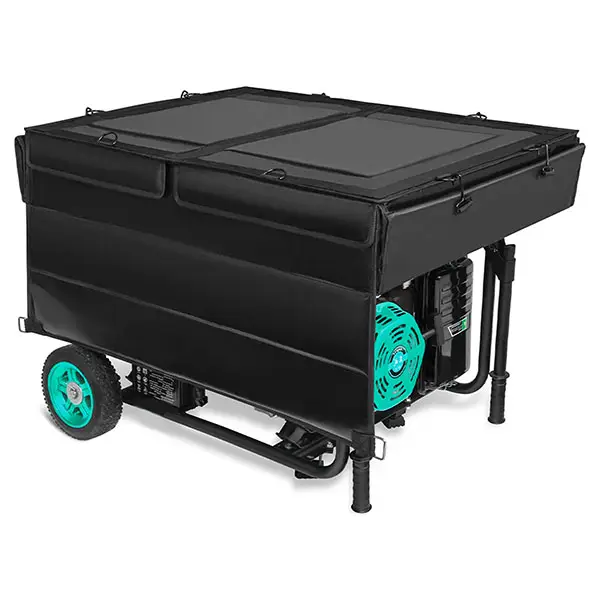
NOTE: We know the question “How To Quiet An RV Generator?” is seriously badly written, but it is the way the question is most often searched for. To appear as an answer in the search engines, we have to quote the question as asked. Cheers.
Change the Muffler
Upgrade to a High-Quality Muffler
Replacing the stock muffler of your generator with a high-quality aftermarket muffler can significantly reduce noise levels. Stock mufflers often prioritize cost over noise reduction, so upgrading to a muffler specifically designed for noise reduction can make a noticeable difference.
Look for a muffler with sound-dampening materials and a design that optimizes noise reduction without compromising performance.
Consider a Generator Exhaust Silencer
A generator exhaust silencer is another option to consider for reducing noise. These silencers are installed in the exhaust system of your generator and work by suppressing sound waves and reducing their intensity. When combined with other noise reduction methods, such as soundproofing the enclosure, an exhaust silencer can help achieve even quieter operation.
Install a Generator Exhaust Extension
Direct the Exhaust Away from the Campsite
Directing the generator exhaust away from your campsite can significantly reduce the noise experienced by you and your camping neighbors. By extending the exhaust pipe and pointing it in a direction opposite to where you spend time, you can minimize the noise reaching your camping area. Ensure the exhaust extension is properly installed and securely attached to prevent any leaks or damage.
Use a Generator Exhaust Pipe
Using a generator exhaust pipe can be an effective way to further reduce noise levels. When selecting an exhaust pipe, choose one specifically designed for noise reduction. These pipes are typically larger in diameter and incorporate sound-dampening materials to minimize the noise emitted by the generator’s exhaust. Ensure the exhaust pipe is correctly installed and properly secured to prevent any leaks or loose connections.
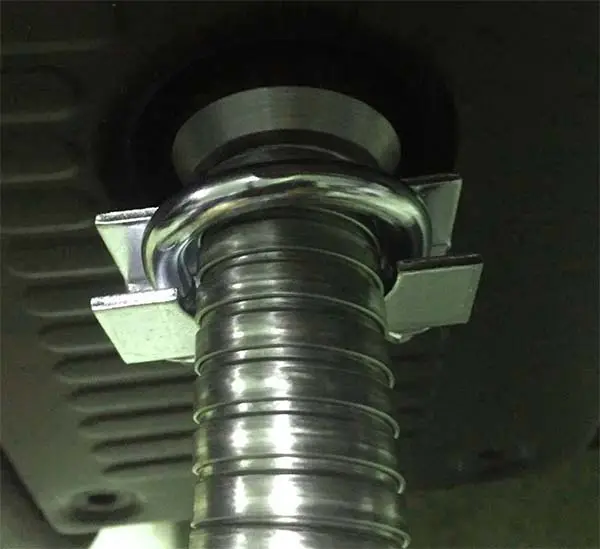
NOTE: We know the question “How To Quiet An RV Generator?” is seriously badly written, but it is the way the question is most often searched for. To appear as an answer in the search engines, we have to quote the question as asked. Cheers.
Distance and Positioning
Place the Generator Far from Your Campsite
The distance between your generator and the camping area is crucial in minimizing noise impact. Position the generator as far away as possible from your campsite to reduce the noise level experienced at your camping area. Find a spot that provides enough ventilation and fuel accessibility while ensuring the generator’s noise is less intrusive. Additionally, consider the noise regulations of the camping area you are in and adhere to any specific guidelines regarding generator placement.
Consider Obstacles and Wind Direction
When determining the positioning of your generator, consider any obstacles that can help block or absorb noise. Natural barriers like trees, bushes, or hills can help mitigate noise by acting as sound absorbers. Similarly, pay attention to the wind direction and position the generator accordingly. By placing it upwind, you can help disperse the emitted noise and prevent it from being carried towards your camping area.
Use Generator Silencing Accessories
Attach a Generator Silencer
A generator silencer is an accessory specifically designed to reduce noise levels emitted by generators. Silencers are typically attached to the exhaust outlet of the generator and work by absorbing or dissipating sound waves. When installed properly, a generator silencer can significantly reduce the noise produced by your RV generator, ensuring a more peaceful camping experience.
Use a Generator Sound Deflector
A generator sound deflector is another accessory that can help minimize noise at your campsite. Sound deflectors are installed around the generator and work by redirecting sound waves away from the camping area. These simple yet effective devices can be easily adjusted to direct noise in the desired direction, allowing you to enjoy a quieter camping experience.
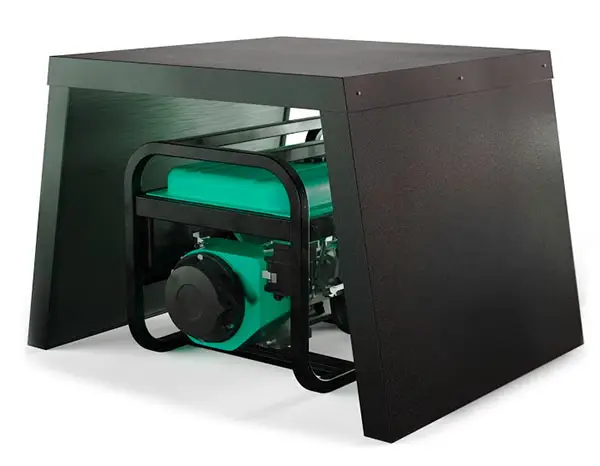
Implement Personal Noise Reduction Measures
Move Your Sleeping Area
If noise from your RV generator is particularly disruptive during sleep, consider rearranging your sleeping area. Position your bed as far away as possible from the generator, preferably on the opposite end of the RV. This can help create a buffer zone and reduce the noise reaching your sleeping area, allowing for a more peaceful night’s sleep.
Use Earplugs or Noise-Canceling Headphones
For those sensitive to noise or in situations where noise reduction measures are not sufficient, using earplugs or noise-canceling headphones can be an effective solution. Earplugs are small devices that fit inside the ear and help block out noise, while noise-canceling headphones actively suppress external noise by producing sound waves that counteract incoming noise. Choose the option that best suits your comfort and preferences to enjoy a quiet and restful camping experience.
Consider Quiet Camping Alternatives
Utilize Solar Power
One alternative to using a generator is to harness the power of the sun through solar panels. Solar power is a clean and quiet energy source that can provide electricity for your RV’s needs. By investing in solar panels and a battery bank, you can charge your devices and run small appliances without relying on a noisy generator. This not only reduces noise pollution but also contributes to a more environmentally friendly camping experience.
Choose Battery-Powered Equipment
Another way to minimize noise while camping is to opt for battery-powered equipment. Many camping essentials, such as lanterns, fans, and even mini-fridges, are now available in battery-powered versions. By choosing battery-powered equipment, you eliminate the need for a generator altogether and can enjoy a peaceful camping experience without the noise and emissions associated with traditional power sources.
In conclusion, there are various ways to quiet an RV generator and create a more peaceful camping experience. By choosing the right generator and implementing effective noise reduction measures, such as soundproofing, modifying the enclosure, and using accessories, you can significantly reduce generator noise.
Additionally, considering alternative power sources, such as solar panels and battery-powered equipment, can further minimize noise pollution while enjoying the great outdoors. Remember, a quiet generator not only benefits you, but also ensures a better experience for your camping neighbors. So, follow these tips and enjoy a tranquil and enjoyable RV camping adventure.
Hope this was helpful, and thanks for reading.
Cheers!
More RV Generator Questions and Answers
How Many Watt Generator For RV?
Can I Start My Rv Generator Thru A Solar Controller?
How Long Do I Need To Run A Generator To Charge RV Batteries?
What Size Generator For 30 Amp RV?
Does RV Generator Charge House Batteries?
Will Generator Charge RV Battery?
How Much Gas a RV Generator Use?

